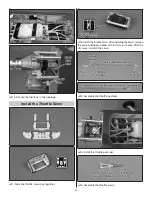
29
CAUTION:
Unless the instructions that came with your
radio system state differently, the
initial
charge on
new
NiMH
transmitter and receiver batteries should be charged
for 15 hours
using the slow-charger that came with the
radio system
. This will “condition” the batteries so that the
next charge may be done using the fast-charger of your
choice. If the initial charge is done with a fast-charger the
batteries may not reach their full capacity and you may be
fl ying with batteries that are only partially charged. If you
are using LiFe transmitter and receiver batteries, follow
the instructions that came with your batteries and be sure
to use a charger that is designed to charge LiFe batteries.
Ground Check and Range Check
Make sure the engine idles reliably, transitions smoothly
and maintains full power indefi nitely. Shut the engine off
and inspect the model closely, making sure all fasteners,
pushrods and connections have remained tight and the hinges
are secure. Follow the radio manufacturer’s instructions to
ground check the operational range of your radio, before
the fi rst fl ight of the day. This should be done once with
the engine off and once with the engine running at various
speeds. If the control surfaces do not respond correctly,
do
not fl y!
Find and correct the problem fi rst. Look for loose
servo connections or broken wires, corroded wires on old
servo connectors, poor solder joints in your battery pack or
a defective battery cell.
ENGINE SAFETY PRECAUTIONS
Failure to follow these safety precautions may result in
severe injury to yourself and others.
Keep all engine fuel in a safe place, away from high heat,
sparks or fl ames, as fuel is very fl ammable. Do not smoke
near the engine or fuel; and remember that engine exhaust
gives off a great deal of deadly carbon monoxide. Therefore
do not run the engine in a closed room or garage
.
Get help from an experienced pilot when learning to operate
engines.
Use safety glasses when starting or running engines.
Use a “chicken stick” or electric starter to start the gasoline
engine. If you do fl ip the propeller with your fi ngers, wear a
heavy leather glove, such as a welder’s glove. When hand-
starting gas engines, if the engine should backfi re, the large
prop can cause severe injury to your hand and fi ngers.
Do not run the engine in an area of loose gravel or sand; the
propeller may throw such material in your face or eyes.
Keep your face and body as well as all spectators away
from the plane of rotation of the propeller as you start and
run the engine.
Keep these items away from the prop: loose clothing, shirt
sleeves, ties, scarfs, long hair or loose objects, such as
pencils or screwdrivers, that may fall out of shirt or jacket
pockets into the prop.
Stop the engine before making any engine adjustments.
The engine and muffl er get hot! Do not touch them during or
right after operation. Make sure fuel lines are in good condition
so fuel will not leak onto a hot engine, causing a fi re.
To stop a gasoline-powered engine, an on/off switch must
be connected to the engine ignition. Do not throw anything
into the propeller of a running engine.
ELECTRIC MOTOR SAFETY
PRECAUTIONS
WARNING:
Once the motor batteries are connected, the
electric motor can start at any time. Make sure the fail-safe
is set on your radio to prevent the motor from starting if the
signal is lost.
WARNING:
Read the entire instruction sheet included with
your motor batteries. Failure to follow the instructions could
cause permanent damage to the battery and its surroundings
and cause bodily harm!
ALWAYS
remove the propeller if the motor batteries will be
connected when working on your plane.
ALWAYS
remove the motor batteries when charging.
ALWAYS
follow the charging instructions included with your
charger for charging LiPo batteries. LiPo batteries can cause
serious damage if misused.
ALWAYS
switch on the transmitter before connecting the
motor battery.
ALWAYS
unplug the motor batteries as soon as your fl ight
is over and
before
turning off your transmitter.
ALWAYS
use a LiPo-approved charger.
ALWAYS
set the charger’s output volts to match the battery
volts.
ALWAYS
charge a LiPo battery in a fi reproof location.
ALWAYS
charge through the “charge” lead.
ALWAYS
KEEP OUT OF THE REACH OF CHILDREN.
ALWAYS
remove the batteries from the plane after a crash.
Set them aside in a safe location for at least 20 minutes. If
the batteries are damaged in the crash, they could catch
fi re. If the battery starts to swell, quickly move the battery
to a safe location, preferably outside. Place it in a bucket,
covering the battery with sand. Never use water to try and
put out a LiPo fi re.
NEVER
touch the motor during or right after operation. The
motor gets HOT!
NEVER
switch off the transmitter with the motor batteries
plugged in.
NEVER
use a NiCd/NiMH peak charger to charge a LiPo
battery.
NEVER
charge in excess of 4.20 V per cell unless the battery
is rated for a higher voltage.
NEVER
charge through the “discharge” lead.
NEVER
charge at currents greater than 1C unless the battery
is rated for a higher charge rate.




































